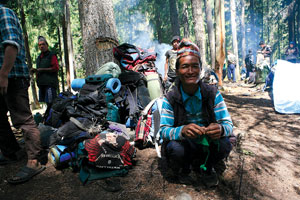 |
When the debate on federalism and constitution was at its peak in the capital last month I was in remote and rugged Dolpo, Nepal's biggest district in area and one of the last without a road connection.
It seemed the entire population of not just Dolpo, but the whole of mid-western Nepal was on the move: trekking up to the high valleys to pick yarsagumba, the caterpillar fungus that is also known as Himalayan viagra and fetches astronomical prices in traditional Chinese medicine.
Yarsagumba has now become the main source of income for a majority of Nepal's Himalayan dwellers. Houses were all padlocked, and entire families had gone off on the annual two-month yarsa exodus. The last thing on the minds of these people was the fast approaching constitution deadline. Others wondered which federal province they would belong to when they returned from the mountains.
More than 150,000 people from Baitadi to Ramechhap, including include four-year-old children to 64-year-olds, are still up there scouring the high meadows for the fungus. None of them had proper clothes to ward off the biting cold at 5,200m. Most wore rubber flipflops, and had no time to enjoy the unearthly beauty of Phoksundo Lake. The middlemen who buy the yarsa, on the other hand, wore fancy down jackets and shades.
The pickers crawl on the ground like four-legged animals looking out for tiny yarsa stems sticking out of the ground. They had to carry in all their food and fuel to last two months. Most survived on raw instant noodles.
These are the refugees of Nepal's development: fleeing joblessness and lack of opportunities in their home districts in a desperate search for income. There is no government where they come from, the VDC secretary is always absent and villagers have to walk up to three days just to get documents signed. The land is dry, there has been no investment in irrigation, and the meager harvest of corn or buckwheat cannot feed families.
Most people from Dailekh, Jajarkot or Rukum here do not know which parties were in the Constituent Assembly, they had little idea about federalism, ethnic or otherwise. They gave blank stares when asked if they preferred a parliamentary system or a presidential one.
Local community groups are doing more for health and education in their villages than the government ever did. Some mistake the UN's World Food Program which distributes food to build roads as a government entity.
Federalism may set all this right. Or it might not. But if it is going to be the same leaders from the same parties, the people know instinctively that nothing is going to change. One of them is Motilal Buda of Sarmi VDC, who has seen governments come and go with no difference in his life. "Politics is only for the leaders," he says, "not for us. We never expected anything from the constitution."
Buda and other pickers who were slightly more aware said they didn't really care how the federal units would be demarcated. Their much more pressing concern is immediate: returning to their villages even deeper in debt because of such slim pickings of yarsa this year.
Debendra Thapa of Rukum, who hadn't found a single yarsa stem in two days, told me in a worried tone: "How do I show my face to my family? I should have never quit my job in India."
The yarsa pickers here are from all ethnic communities. They are all downtrodden, discriminated against, socially, economically and politically excluded. They represent Nepal in a microcosm. But just because they don't seem to care about federalism, doesn't mean their concerns should be discounted by those in for whom federalism is just political football.
What the people really need and never got is quality, affordable education, and to use that to rise up and be heard. They just want to be treated equally, have a chance to improve their lives.
Over the decades, successive governments in over-centralised Kathmandu failed to address these concerns. Federalism would share governance between national and provincial governments, and bring well-being and prosperity because equal citizens would enjoy rights that come with responsibility.
Sitting around a camp fire one evening after a day of fruitless yarsa picking, Krishna Rokaya of Jumla was hopeful that federalism would make life better. He was convinced Nepal would be better governed that way. I could only nod.
Read also:
Reflecting reality
Yarsa land, DEWAN RAI in DOLPO
Over-harvesting and lack of regulation have ruined the cash crop on which Nepal's Himalayan dwellers depend for survival



